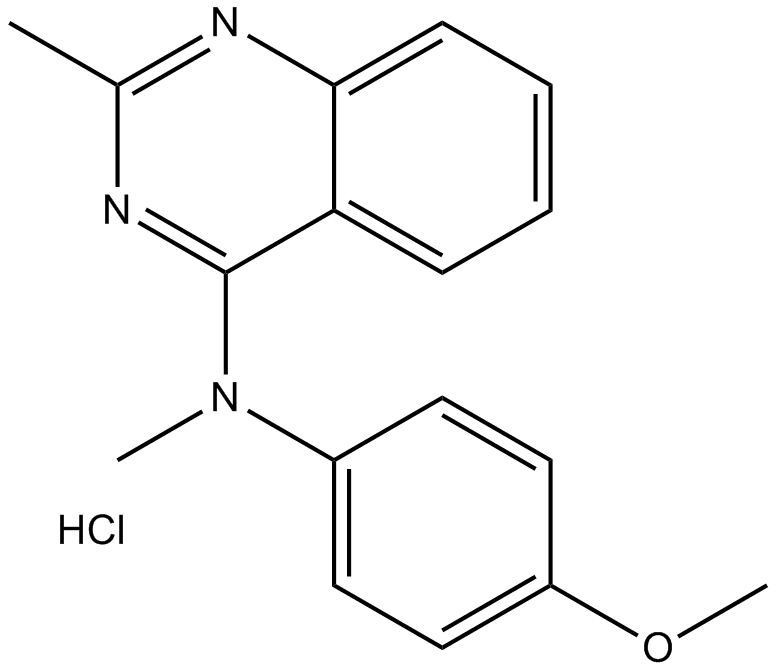MPC 6827 hydrochloride (Synonyms: Verubulin) |
| Catalog No.GC15285 |
MPC 6827 염산염(MPC-6827 염산염)은 강력하고 광범위한 시험관내 및 생체내 세포독성 활성을 갖는 혈액 뇌 장벽 투과성 미세소관 교란제입니다. MPC 6827 염산염(MPC-6827 염산염)은 인간 MX-1 유방 및 기타 마우스 이종이식 암 모델에서 강력한 항암 활성을 나타냅니다. MPC 6827 염산염(MPC 6827 염산염)은 여러 암 유형의 치료를 위한 유망한 후보입니다.
Products are for research use only. Not for human use. We do not sell to patients.

Cas No.: 917369-31-4
Sample solution is provided at 25 µL, 10mM.
MPC-6827 (Azixa) is a small-molecule microtubule-destabilizing agent that binds to the same (or nearby) sites on β-tubulin as colchicine.[1]
Tubulin is a heterodimer consisting of an αand βmonomer, it can be covalently labeled with [3H] colchicine by near UV irradiation. Most of the label appears in β tubulin. Colchicine binds to tubulin with a stoichiometry of one and inhibits microtubule assembly substoichiometrically. Colchicine binding to tubulin exhibits pseudoirreversible kinetics; it displays a fast step followed by a slow step involving conformational changes of both ligand and tubulin. The tubulin, in turn, promotes fluorescence characteristic of the tropolone moiety of colchicine. [2]
MPC-6827 is a small-molecule microtubule-destabilizing agent that causes mitotic arrest and cell death. MPC-6827 interfere with microtubule dynamics, leading to arrest of dividing cells in the G2-M phase of the cell cycle, which eventually results in apoptotic cell death.[1]
In vivo, MPC-6827 significantly inhibits the growth of various subcutaneously implanted tumor lines. MPC-6827 has also been shown to be a vascular-disrupting agent (VDA) in a human ovarian carcinoma xenograft model. It also has shown synergism with carboplatin in a mouse xenograft model. Furthermore, MPC-6827 has been shown to inhibit the growth of human glioblastoma tumor cell line (D-54) implanted intracranially in athymic nude mice. [1]
References:
[1] Tsimberidou AM1, Akerley W, Schabel MC, etal. , Phase I clinical trial of MPC-6827 (Azixa), a microtubule destabilizing agent, in patients with advanced cancer. Mol Cancer Ther. 2010 Dec;9(12):3410-9.
[2] Uppuluri S, Knipling L, Sackett DL, Wolff J. Localization of the colchicine-binding site of tubulin. Proc Natl Acad Sci U S A. 1993 Dec 15;90(24):11598-602.
Average Rating: 5 (Based on Reviews and 38 reference(s) in Google Scholar.)
GLPBIO products are for RESEARCH USE ONLY. Please make sure your review or question is research based.
Required fields are marked with *




















